International Business: Evaluating WTO's Impact on Global Trade
VerifiedAdded on 2022/12/27
|14
|4029
|1
Report
AI Summary
This report provides a detailed analysis of the World Trade Organization (WTO) within the context of international business. It begins with an executive summary, followed by an introduction outlining the scope of the study. A comprehensive literature review explores the motivations behind the WTO's formation, examining factors such as political and economic influences. The report delves into the WTO's key functions, including the development of global trade rules and the resolution of trade disputes. An analysis and discussion section evaluates the political and economic factors driving the WTO's establishment, alongside its key functions. The report also discusses the challenges faced by international organizations, such as transportation difficulties and market entry strategies, and how the WTO addresses these issues. The conclusion summarizes the main findings, and the report includes a list of references and a bibliography to support the analysis.
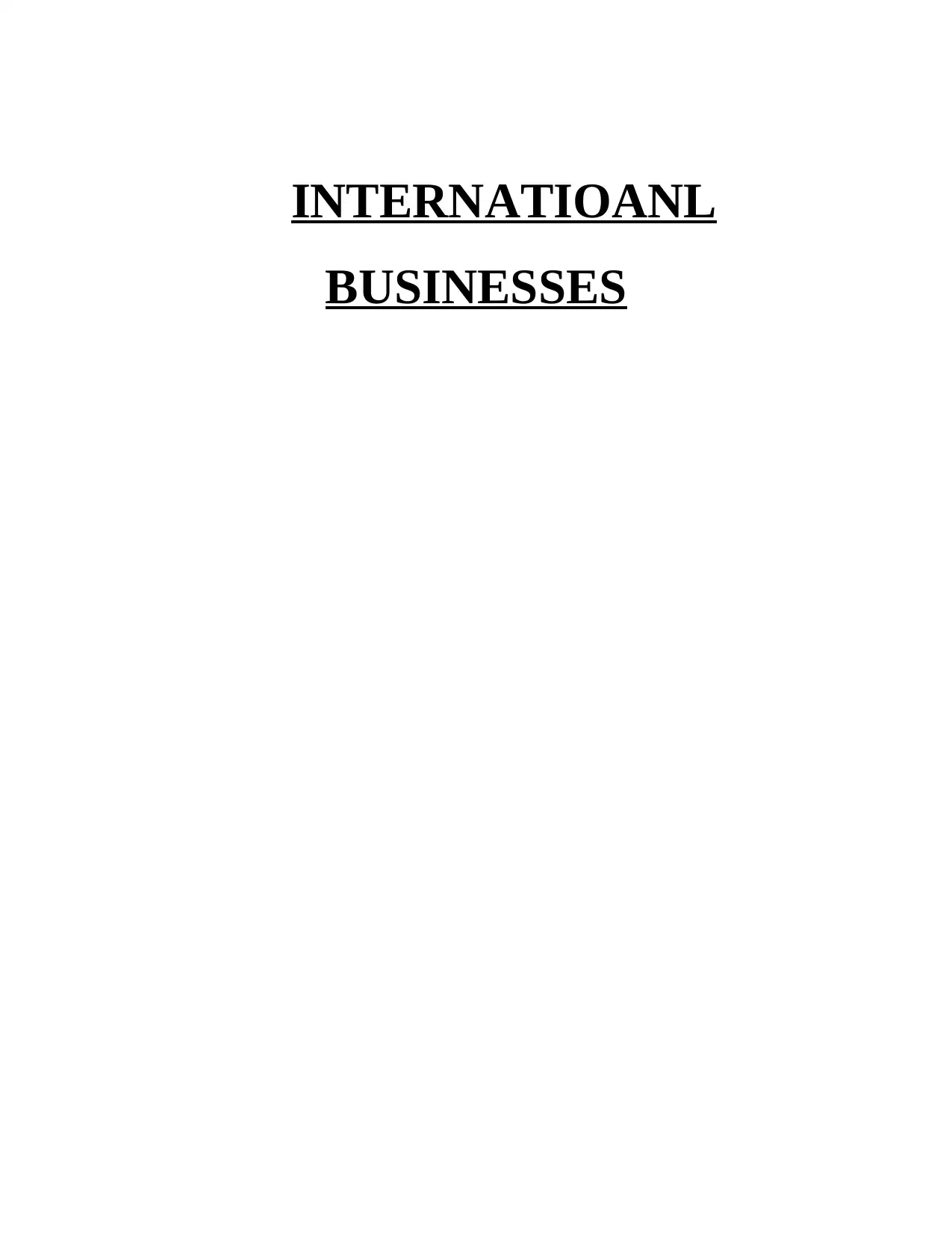
INTERNATIOANL
BUSINESSES
BUSINESSES
Paraphrase This Document
Need a fresh take? Get an instant paraphrase of this document with our AI Paraphraser
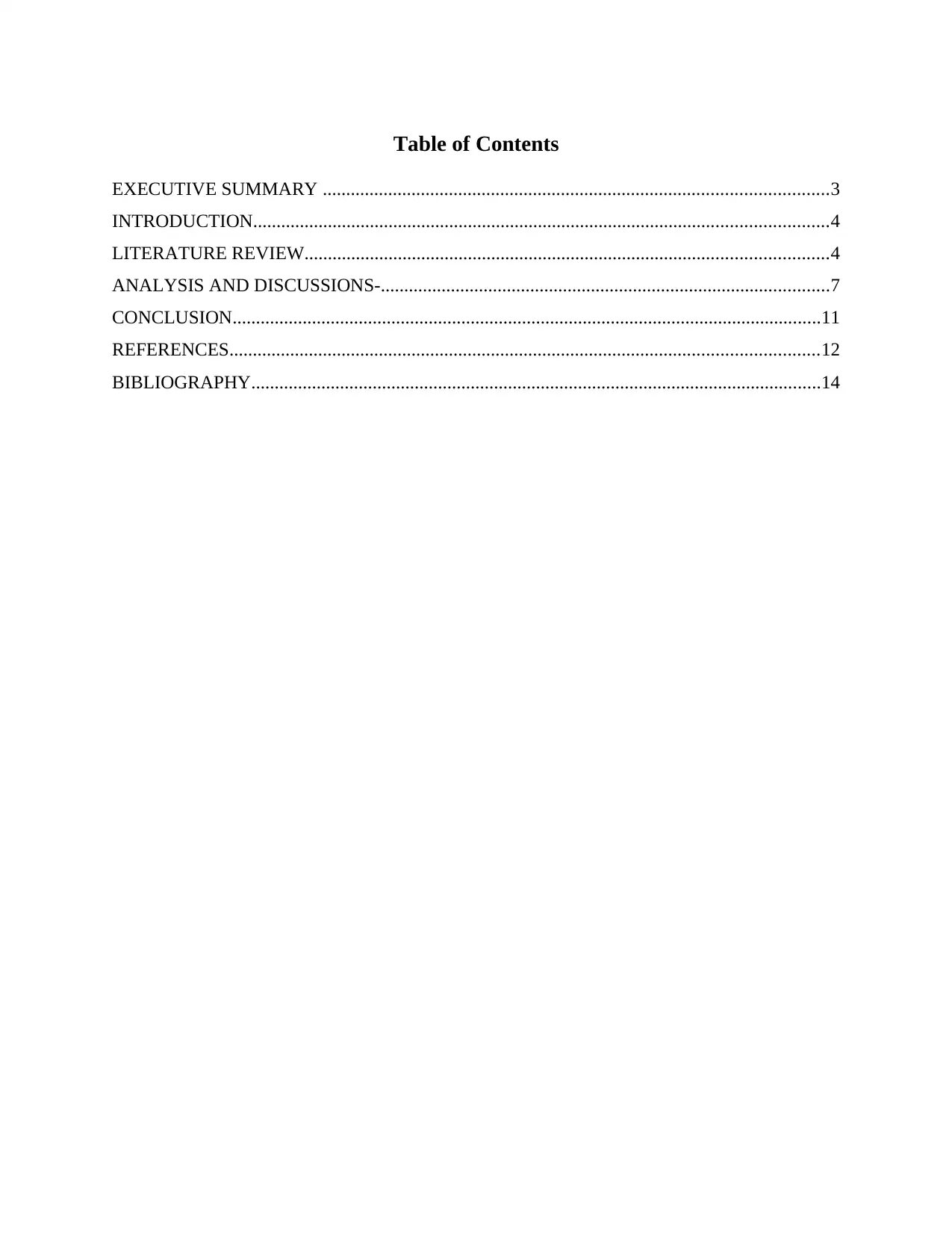
Table of Contents
EXECUTIVE SUMMARY ............................................................................................................3
INTRODUCTION...........................................................................................................................4
LITERATURE REVIEW................................................................................................................4
ANALYSIS AND DISCUSSIONS-................................................................................................7
CONCLUSION..............................................................................................................................11
REFERENCES..............................................................................................................................12
BIBLIOGRAPHY..........................................................................................................................14
EXECUTIVE SUMMARY ............................................................................................................3
INTRODUCTION...........................................................................................................................4
LITERATURE REVIEW................................................................................................................4
ANALYSIS AND DISCUSSIONS-................................................................................................7
CONCLUSION..............................................................................................................................11
REFERENCES..............................................................................................................................12
BIBLIOGRAPHY..........................................................................................................................14
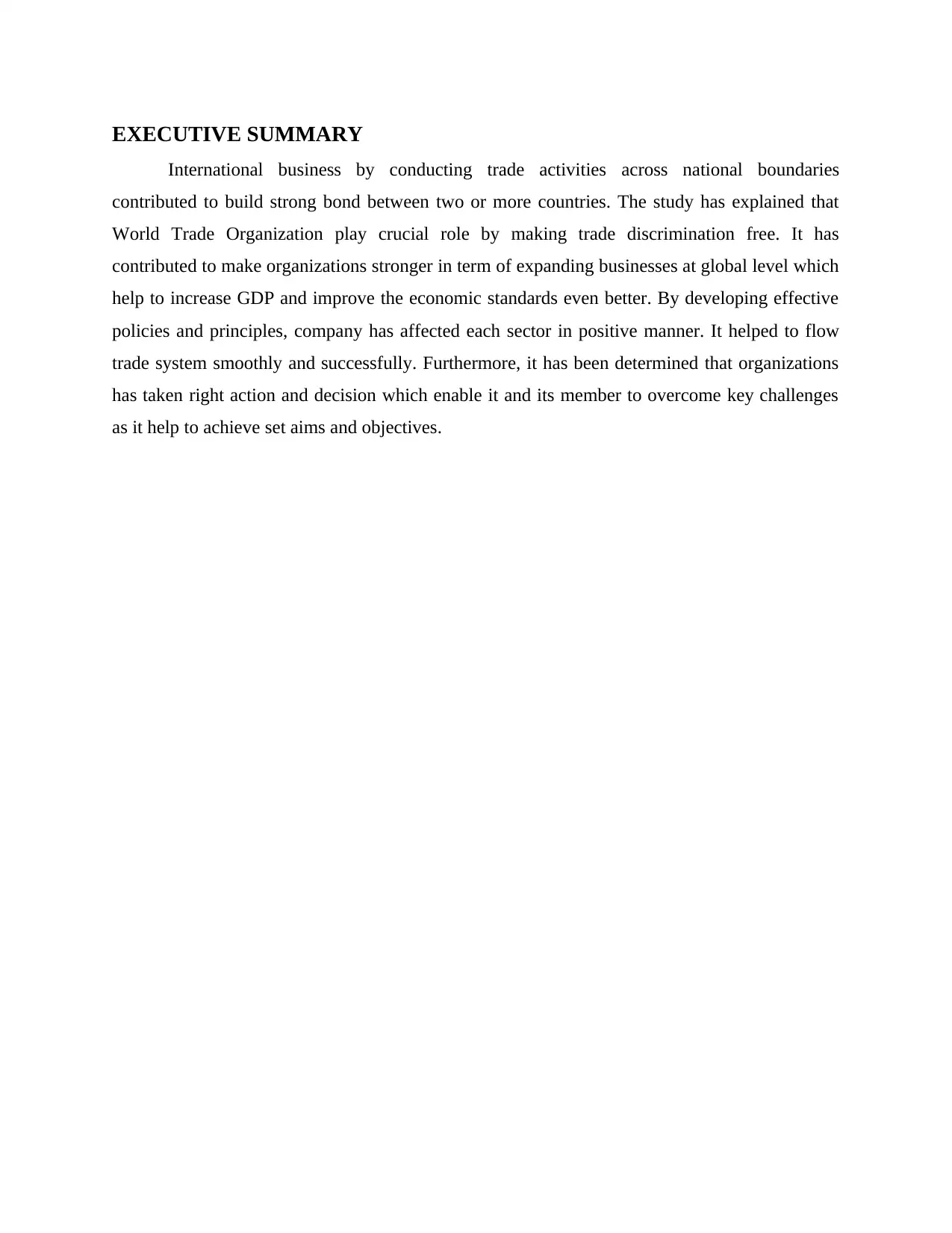
EXECUTIVE SUMMARY
International business by conducting trade activities across national boundaries
contributed to build strong bond between two or more countries. The study has explained that
World Trade Organization play crucial role by making trade discrimination free. It has
contributed to make organizations stronger in term of expanding businesses at global level which
help to increase GDP and improve the economic standards even better. By developing effective
policies and principles, company has affected each sector in positive manner. It helped to flow
trade system smoothly and successfully. Furthermore, it has been determined that organizations
has taken right action and decision which enable it and its member to overcome key challenges
as it help to achieve set aims and objectives.
International business by conducting trade activities across national boundaries
contributed to build strong bond between two or more countries. The study has explained that
World Trade Organization play crucial role by making trade discrimination free. It has
contributed to make organizations stronger in term of expanding businesses at global level which
help to increase GDP and improve the economic standards even better. By developing effective
policies and principles, company has affected each sector in positive manner. It helped to flow
trade system smoothly and successfully. Furthermore, it has been determined that organizations
has taken right action and decision which enable it and its member to overcome key challenges
as it help to achieve set aims and objectives.
⊘ This is a preview!⊘
Do you want full access?
Subscribe today to unlock all pages.

Trusted by 1+ million students worldwide
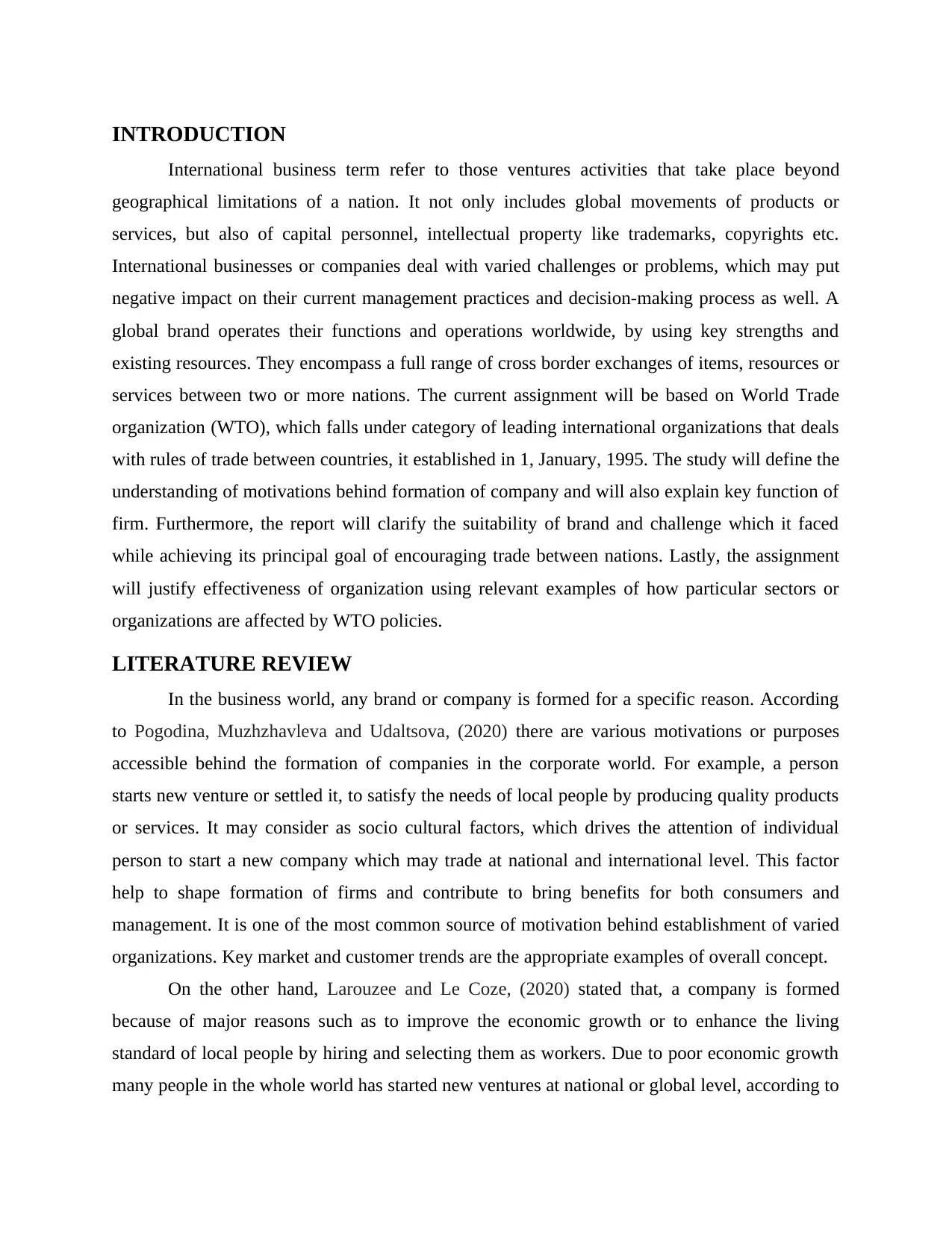
INTRODUCTION
International business term refer to those ventures activities that take place beyond
geographical limitations of a nation. It not only includes global movements of products or
services, but also of capital personnel, intellectual property like trademarks, copyrights etc.
International businesses or companies deal with varied challenges or problems, which may put
negative impact on their current management practices and decision-making process as well. A
global brand operates their functions and operations worldwide, by using key strengths and
existing resources. They encompass a full range of cross border exchanges of items, resources or
services between two or more nations. The current assignment will be based on World Trade
organization (WTO), which falls under category of leading international organizations that deals
with rules of trade between countries, it established in 1, January, 1995. The study will define the
understanding of motivations behind formation of company and will also explain key function of
firm. Furthermore, the report will clarify the suitability of brand and challenge which it faced
while achieving its principal goal of encouraging trade between nations. Lastly, the assignment
will justify effectiveness of organization using relevant examples of how particular sectors or
organizations are affected by WTO policies.
LITERATURE REVIEW
In the business world, any brand or company is formed for a specific reason. According
to Pogodina, Muzhzhavleva and Udaltsova, (2020) there are various motivations or purposes
accessible behind the formation of companies in the corporate world. For example, a person
starts new venture or settled it, to satisfy the needs of local people by producing quality products
or services. It may consider as socio cultural factors, which drives the attention of individual
person to start a new company which may trade at national and international level. This factor
help to shape formation of firms and contribute to bring benefits for both consumers and
management. It is one of the most common source of motivation behind establishment of varied
organizations. Key market and customer trends are the appropriate examples of overall concept.
On the other hand, Larouzee and Le Coze, (2020) stated that, a company is formed
because of major reasons such as to improve the economic growth or to enhance the living
standard of local people by hiring and selecting them as workers. Due to poor economic growth
many people in the whole world has started new ventures at national or global level, according to
International business term refer to those ventures activities that take place beyond
geographical limitations of a nation. It not only includes global movements of products or
services, but also of capital personnel, intellectual property like trademarks, copyrights etc.
International businesses or companies deal with varied challenges or problems, which may put
negative impact on their current management practices and decision-making process as well. A
global brand operates their functions and operations worldwide, by using key strengths and
existing resources. They encompass a full range of cross border exchanges of items, resources or
services between two or more nations. The current assignment will be based on World Trade
organization (WTO), which falls under category of leading international organizations that deals
with rules of trade between countries, it established in 1, January, 1995. The study will define the
understanding of motivations behind formation of company and will also explain key function of
firm. Furthermore, the report will clarify the suitability of brand and challenge which it faced
while achieving its principal goal of encouraging trade between nations. Lastly, the assignment
will justify effectiveness of organization using relevant examples of how particular sectors or
organizations are affected by WTO policies.
LITERATURE REVIEW
In the business world, any brand or company is formed for a specific reason. According
to Pogodina, Muzhzhavleva and Udaltsova, (2020) there are various motivations or purposes
accessible behind the formation of companies in the corporate world. For example, a person
starts new venture or settled it, to satisfy the needs of local people by producing quality products
or services. It may consider as socio cultural factors, which drives the attention of individual
person to start a new company which may trade at national and international level. This factor
help to shape formation of firms and contribute to bring benefits for both consumers and
management. It is one of the most common source of motivation behind establishment of varied
organizations. Key market and customer trends are the appropriate examples of overall concept.
On the other hand, Larouzee and Le Coze, (2020) stated that, a company is formed
because of major reasons such as to improve the economic growth or to enhance the living
standard of local people by hiring and selecting them as workers. Due to poor economic growth
many people in the whole world has started new ventures at national or global level, according to
Paraphrase This Document
Need a fresh take? Get an instant paraphrase of this document with our AI Paraphraser
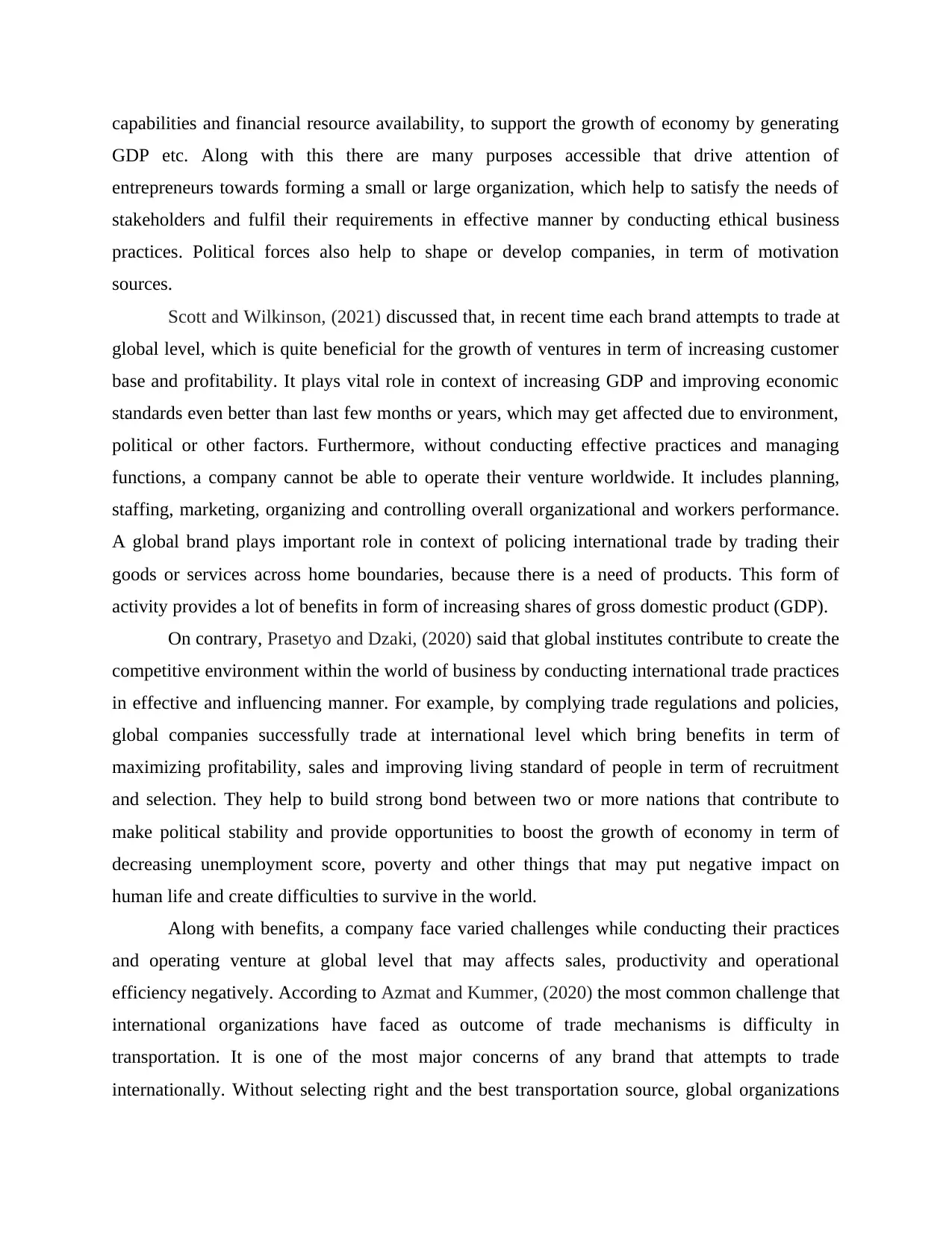
capabilities and financial resource availability, to support the growth of economy by generating
GDP etc. Along with this there are many purposes accessible that drive attention of
entrepreneurs towards forming a small or large organization, which help to satisfy the needs of
stakeholders and fulfil their requirements in effective manner by conducting ethical business
practices. Political forces also help to shape or develop companies, in term of motivation
sources.
Scott and Wilkinson, (2021) discussed that, in recent time each brand attempts to trade at
global level, which is quite beneficial for the growth of ventures in term of increasing customer
base and profitability. It plays vital role in context of increasing GDP and improving economic
standards even better than last few months or years, which may get affected due to environment,
political or other factors. Furthermore, without conducting effective practices and managing
functions, a company cannot be able to operate their venture worldwide. It includes planning,
staffing, marketing, organizing and controlling overall organizational and workers performance.
A global brand plays important role in context of policing international trade by trading their
goods or services across home boundaries, because there is a need of products. This form of
activity provides a lot of benefits in form of increasing shares of gross domestic product (GDP).
On contrary, Prasetyo and Dzaki, (2020) said that global institutes contribute to create the
competitive environment within the world of business by conducting international trade practices
in effective and influencing manner. For example, by complying trade regulations and policies,
global companies successfully trade at international level which bring benefits in term of
maximizing profitability, sales and improving living standard of people in term of recruitment
and selection. They help to build strong bond between two or more nations that contribute to
make political stability and provide opportunities to boost the growth of economy in term of
decreasing unemployment score, poverty and other things that may put negative impact on
human life and create difficulties to survive in the world.
Along with benefits, a company face varied challenges while conducting their practices
and operating venture at global level that may affects sales, productivity and operational
efficiency negatively. According to Azmat and Kummer, (2020) the most common challenge that
international organizations have faced as outcome of trade mechanisms is difficulty in
transportation. It is one of the most major concerns of any brand that attempts to trade
internationally. Without selecting right and the best transportation source, global organizations
GDP etc. Along with this there are many purposes accessible that drive attention of
entrepreneurs towards forming a small or large organization, which help to satisfy the needs of
stakeholders and fulfil their requirements in effective manner by conducting ethical business
practices. Political forces also help to shape or develop companies, in term of motivation
sources.
Scott and Wilkinson, (2021) discussed that, in recent time each brand attempts to trade at
global level, which is quite beneficial for the growth of ventures in term of increasing customer
base and profitability. It plays vital role in context of increasing GDP and improving economic
standards even better than last few months or years, which may get affected due to environment,
political or other factors. Furthermore, without conducting effective practices and managing
functions, a company cannot be able to operate their venture worldwide. It includes planning,
staffing, marketing, organizing and controlling overall organizational and workers performance.
A global brand plays important role in context of policing international trade by trading their
goods or services across home boundaries, because there is a need of products. This form of
activity provides a lot of benefits in form of increasing shares of gross domestic product (GDP).
On contrary, Prasetyo and Dzaki, (2020) said that global institutes contribute to create the
competitive environment within the world of business by conducting international trade practices
in effective and influencing manner. For example, by complying trade regulations and policies,
global companies successfully trade at international level which bring benefits in term of
maximizing profitability, sales and improving living standard of people in term of recruitment
and selection. They help to build strong bond between two or more nations that contribute to
make political stability and provide opportunities to boost the growth of economy in term of
decreasing unemployment score, poverty and other things that may put negative impact on
human life and create difficulties to survive in the world.
Along with benefits, a company face varied challenges while conducting their practices
and operating venture at global level that may affects sales, productivity and operational
efficiency negatively. According to Azmat and Kummer, (2020) the most common challenge that
international organizations have faced as outcome of trade mechanisms is difficulty in
transportation. It is one of the most major concerns of any brand that attempts to trade
internationally. Without selecting right and the best transportation source, global organizations
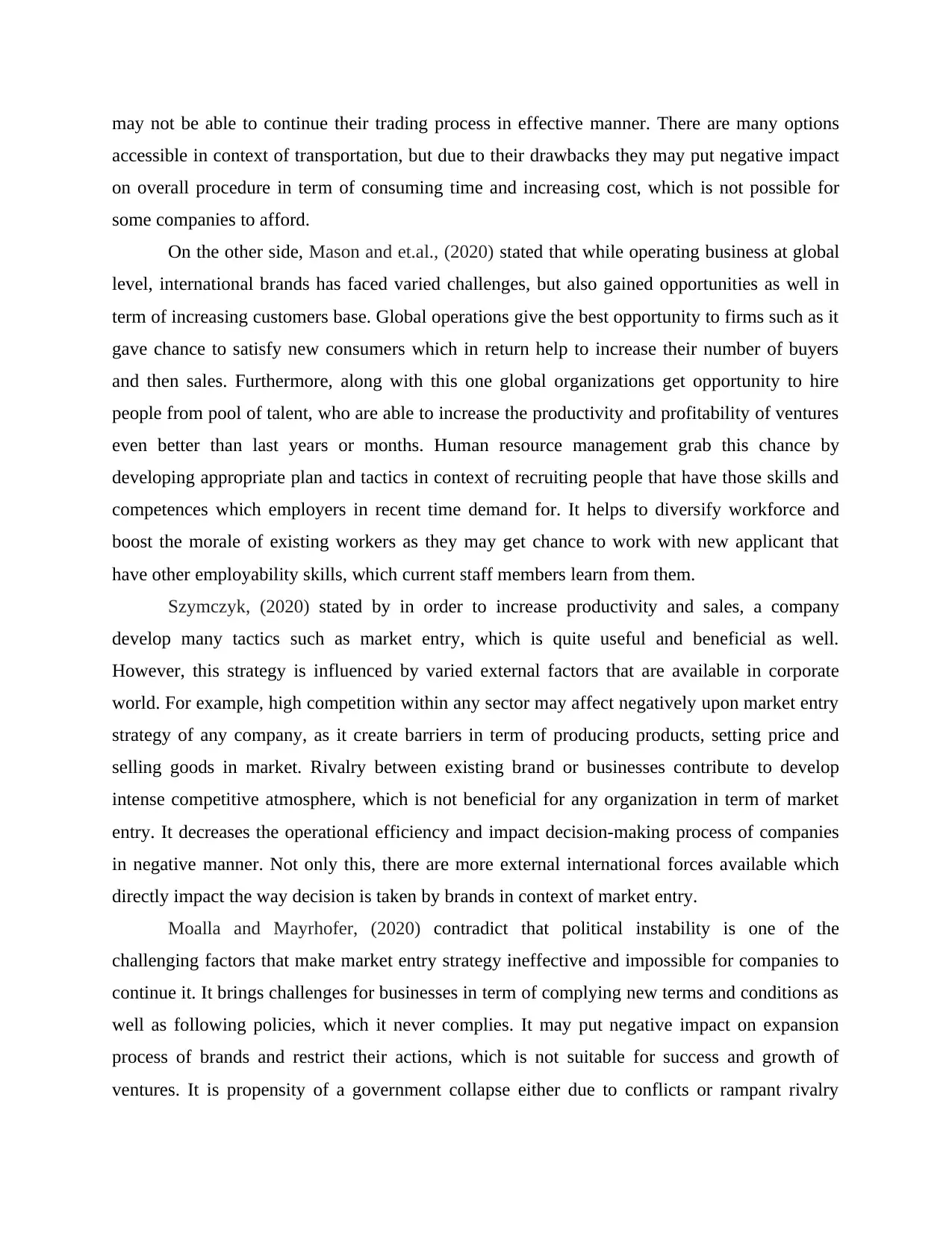
may not be able to continue their trading process in effective manner. There are many options
accessible in context of transportation, but due to their drawbacks they may put negative impact
on overall procedure in term of consuming time and increasing cost, which is not possible for
some companies to afford.
On the other side, Mason and et.al., (2020) stated that while operating business at global
level, international brands has faced varied challenges, but also gained opportunities as well in
term of increasing customers base. Global operations give the best opportunity to firms such as it
gave chance to satisfy new consumers which in return help to increase their number of buyers
and then sales. Furthermore, along with this one global organizations get opportunity to hire
people from pool of talent, who are able to increase the productivity and profitability of ventures
even better than last years or months. Human resource management grab this chance by
developing appropriate plan and tactics in context of recruiting people that have those skills and
competences which employers in recent time demand for. It helps to diversify workforce and
boost the morale of existing workers as they may get chance to work with new applicant that
have other employability skills, which current staff members learn from them.
Szymczyk, (2020) stated by in order to increase productivity and sales, a company
develop many tactics such as market entry, which is quite useful and beneficial as well.
However, this strategy is influenced by varied external factors that are available in corporate
world. For example, high competition within any sector may affect negatively upon market entry
strategy of any company, as it create barriers in term of producing products, setting price and
selling goods in market. Rivalry between existing brand or businesses contribute to develop
intense competitive atmosphere, which is not beneficial for any organization in term of market
entry. It decreases the operational efficiency and impact decision-making process of companies
in negative manner. Not only this, there are more external international forces available which
directly impact the way decision is taken by brands in context of market entry.
Moalla and Mayrhofer, (2020) contradict that political instability is one of the
challenging factors that make market entry strategy ineffective and impossible for companies to
continue it. It brings challenges for businesses in term of complying new terms and conditions as
well as following policies, which it never complies. It may put negative impact on expansion
process of brands and restrict their actions, which is not suitable for success and growth of
ventures. It is propensity of a government collapse either due to conflicts or rampant rivalry
accessible in context of transportation, but due to their drawbacks they may put negative impact
on overall procedure in term of consuming time and increasing cost, which is not possible for
some companies to afford.
On the other side, Mason and et.al., (2020) stated that while operating business at global
level, international brands has faced varied challenges, but also gained opportunities as well in
term of increasing customers base. Global operations give the best opportunity to firms such as it
gave chance to satisfy new consumers which in return help to increase their number of buyers
and then sales. Furthermore, along with this one global organizations get opportunity to hire
people from pool of talent, who are able to increase the productivity and profitability of ventures
even better than last years or months. Human resource management grab this chance by
developing appropriate plan and tactics in context of recruiting people that have those skills and
competences which employers in recent time demand for. It helps to diversify workforce and
boost the morale of existing workers as they may get chance to work with new applicant that
have other employability skills, which current staff members learn from them.
Szymczyk, (2020) stated by in order to increase productivity and sales, a company
develop many tactics such as market entry, which is quite useful and beneficial as well.
However, this strategy is influenced by varied external factors that are available in corporate
world. For example, high competition within any sector may affect negatively upon market entry
strategy of any company, as it create barriers in term of producing products, setting price and
selling goods in market. Rivalry between existing brand or businesses contribute to develop
intense competitive atmosphere, which is not beneficial for any organization in term of market
entry. It decreases the operational efficiency and impact decision-making process of companies
in negative manner. Not only this, there are more external international forces available which
directly impact the way decision is taken by brands in context of market entry.
Moalla and Mayrhofer, (2020) contradict that political instability is one of the
challenging factors that make market entry strategy ineffective and impossible for companies to
continue it. It brings challenges for businesses in term of complying new terms and conditions as
well as following policies, which it never complies. It may put negative impact on expansion
process of brands and restrict their actions, which is not suitable for success and growth of
ventures. It is propensity of a government collapse either due to conflicts or rampant rivalry
⊘ This is a preview!⊘
Do you want full access?
Subscribe today to unlock all pages.

Trusted by 1+ million students worldwide
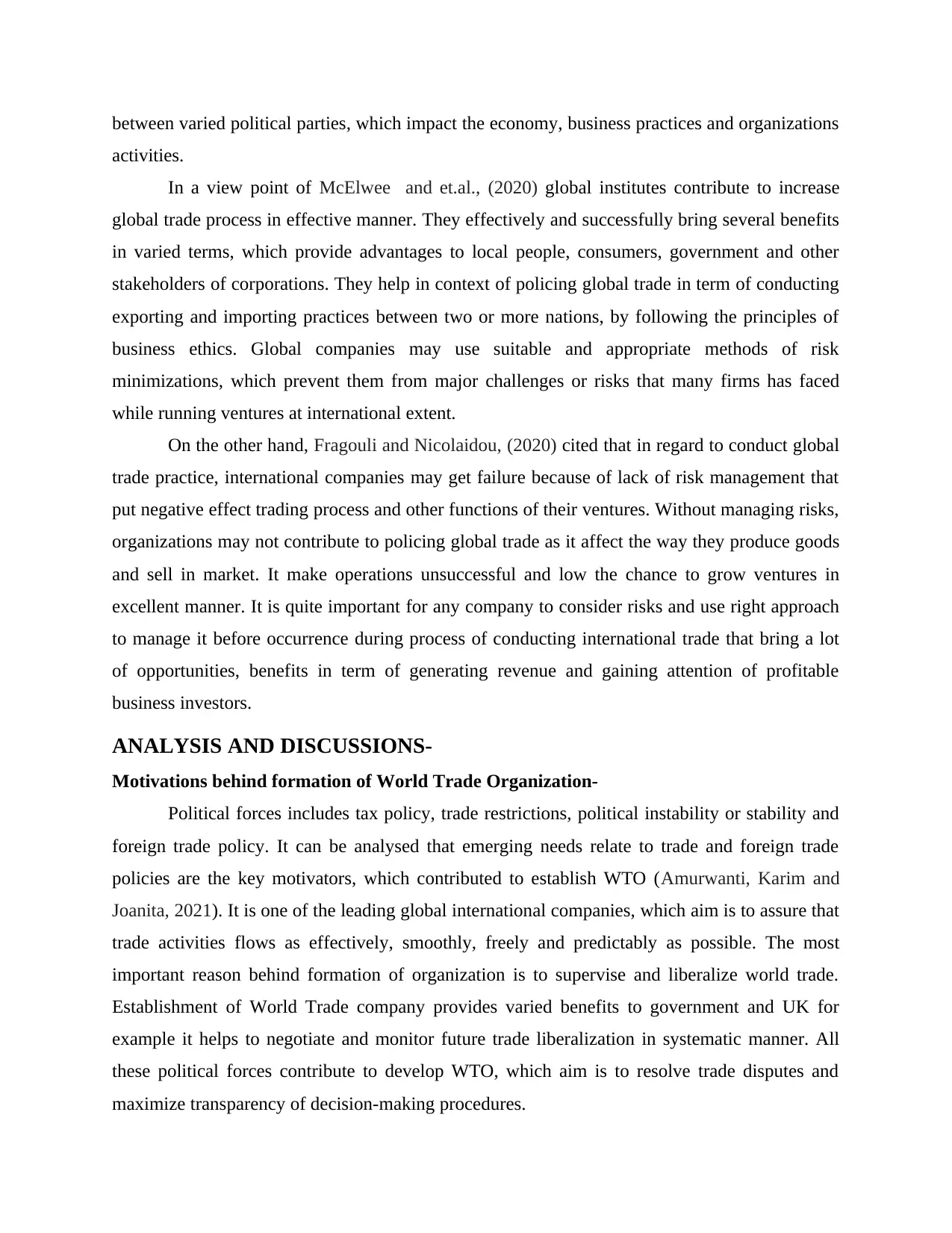
between varied political parties, which impact the economy, business practices and organizations
activities.
In a view point of McElwee and et.al., (2020) global institutes contribute to increase
global trade process in effective manner. They effectively and successfully bring several benefits
in varied terms, which provide advantages to local people, consumers, government and other
stakeholders of corporations. They help in context of policing global trade in term of conducting
exporting and importing practices between two or more nations, by following the principles of
business ethics. Global companies may use suitable and appropriate methods of risk
minimizations, which prevent them from major challenges or risks that many firms has faced
while running ventures at international extent.
On the other hand, Fragouli and Nicolaidou, (2020) cited that in regard to conduct global
trade practice, international companies may get failure because of lack of risk management that
put negative effect trading process and other functions of their ventures. Without managing risks,
organizations may not contribute to policing global trade as it affect the way they produce goods
and sell in market. It make operations unsuccessful and low the chance to grow ventures in
excellent manner. It is quite important for any company to consider risks and use right approach
to manage it before occurrence during process of conducting international trade that bring a lot
of opportunities, benefits in term of generating revenue and gaining attention of profitable
business investors.
ANALYSIS AND DISCUSSIONS-
Motivations behind formation of World Trade Organization-
Political forces includes tax policy, trade restrictions, political instability or stability and
foreign trade policy. It can be analysed that emerging needs relate to trade and foreign trade
policies are the key motivators, which contributed to establish WTO (Amurwanti, Karim and
Joanita, 2021). It is one of the leading global international companies, which aim is to assure that
trade activities flows as effectively, smoothly, freely and predictably as possible. The most
important reason behind formation of organization is to supervise and liberalize world trade.
Establishment of World Trade company provides varied benefits to government and UK for
example it helps to negotiate and monitor future trade liberalization in systematic manner. All
these political forces contribute to develop WTO, which aim is to resolve trade disputes and
maximize transparency of decision-making procedures.
activities.
In a view point of McElwee and et.al., (2020) global institutes contribute to increase
global trade process in effective manner. They effectively and successfully bring several benefits
in varied terms, which provide advantages to local people, consumers, government and other
stakeholders of corporations. They help in context of policing global trade in term of conducting
exporting and importing practices between two or more nations, by following the principles of
business ethics. Global companies may use suitable and appropriate methods of risk
minimizations, which prevent them from major challenges or risks that many firms has faced
while running ventures at international extent.
On the other hand, Fragouli and Nicolaidou, (2020) cited that in regard to conduct global
trade practice, international companies may get failure because of lack of risk management that
put negative effect trading process and other functions of their ventures. Without managing risks,
organizations may not contribute to policing global trade as it affect the way they produce goods
and sell in market. It make operations unsuccessful and low the chance to grow ventures in
excellent manner. It is quite important for any company to consider risks and use right approach
to manage it before occurrence during process of conducting international trade that bring a lot
of opportunities, benefits in term of generating revenue and gaining attention of profitable
business investors.
ANALYSIS AND DISCUSSIONS-
Motivations behind formation of World Trade Organization-
Political forces includes tax policy, trade restrictions, political instability or stability and
foreign trade policy. It can be analysed that emerging needs relate to trade and foreign trade
policies are the key motivators, which contributed to establish WTO (Amurwanti, Karim and
Joanita, 2021). It is one of the leading global international companies, which aim is to assure that
trade activities flows as effectively, smoothly, freely and predictably as possible. The most
important reason behind formation of organization is to supervise and liberalize world trade.
Establishment of World Trade company provides varied benefits to government and UK for
example it helps to negotiate and monitor future trade liberalization in systematic manner. All
these political forces contribute to develop WTO, which aim is to resolve trade disputes and
maximize transparency of decision-making procedures.
Paraphrase This Document
Need a fresh take? Get an instant paraphrase of this document with our AI Paraphraser
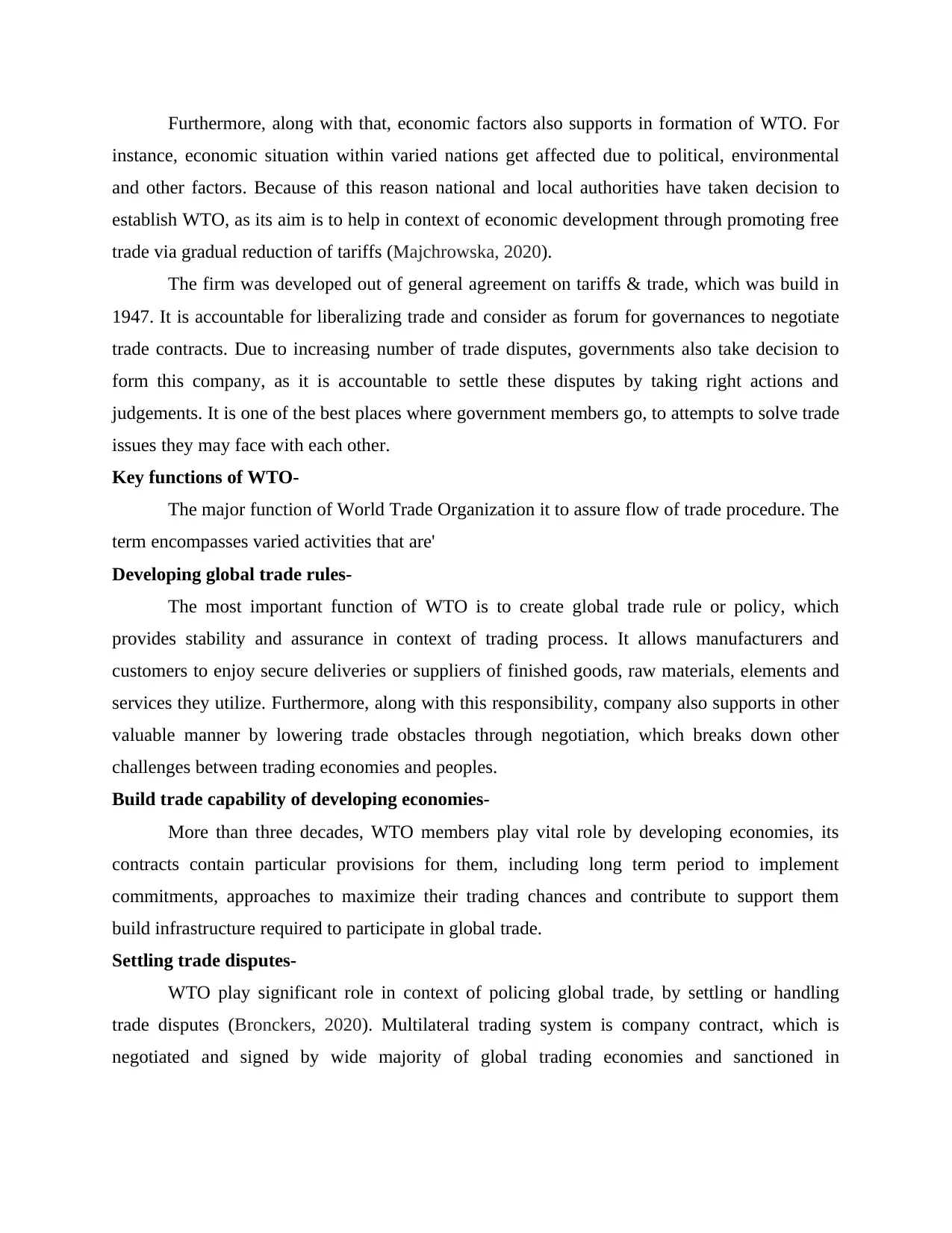
Furthermore, along with that, economic factors also supports in formation of WTO. For
instance, economic situation within varied nations get affected due to political, environmental
and other factors. Because of this reason national and local authorities have taken decision to
establish WTO, as its aim is to help in context of economic development through promoting free
trade via gradual reduction of tariffs (Majchrowska, 2020).
The firm was developed out of general agreement on tariffs & trade, which was build in
1947. It is accountable for liberalizing trade and consider as forum for governances to negotiate
trade contracts. Due to increasing number of trade disputes, governments also take decision to
form this company, as it is accountable to settle these disputes by taking right actions and
judgements. It is one of the best places where government members go, to attempts to solve trade
issues they may face with each other.
Key functions of WTO-
The major function of World Trade Organization it to assure flow of trade procedure. The
term encompasses varied activities that are'
Developing global trade rules-
The most important function of WTO is to create global trade rule or policy, which
provides stability and assurance in context of trading process. It allows manufacturers and
customers to enjoy secure deliveries or suppliers of finished goods, raw materials, elements and
services they utilize. Furthermore, along with this responsibility, company also supports in other
valuable manner by lowering trade obstacles through negotiation, which breaks down other
challenges between trading economies and peoples.
Build trade capability of developing economies-
More than three decades, WTO members play vital role by developing economies, its
contracts contain particular provisions for them, including long term period to implement
commitments, approaches to maximize their trading chances and contribute to support them
build infrastructure required to participate in global trade.
Settling trade disputes-
WTO play significant role in context of policing global trade, by settling or handling
trade disputes (Bronckers, 2020). Multilateral trading system is company contract, which is
negotiated and signed by wide majority of global trading economies and sanctioned in
instance, economic situation within varied nations get affected due to political, environmental
and other factors. Because of this reason national and local authorities have taken decision to
establish WTO, as its aim is to help in context of economic development through promoting free
trade via gradual reduction of tariffs (Majchrowska, 2020).
The firm was developed out of general agreement on tariffs & trade, which was build in
1947. It is accountable for liberalizing trade and consider as forum for governances to negotiate
trade contracts. Due to increasing number of trade disputes, governments also take decision to
form this company, as it is accountable to settle these disputes by taking right actions and
judgements. It is one of the best places where government members go, to attempts to solve trade
issues they may face with each other.
Key functions of WTO-
The major function of World Trade Organization it to assure flow of trade procedure. The
term encompasses varied activities that are'
Developing global trade rules-
The most important function of WTO is to create global trade rule or policy, which
provides stability and assurance in context of trading process. It allows manufacturers and
customers to enjoy secure deliveries or suppliers of finished goods, raw materials, elements and
services they utilize. Furthermore, along with this responsibility, company also supports in other
valuable manner by lowering trade obstacles through negotiation, which breaks down other
challenges between trading economies and peoples.
Build trade capability of developing economies-
More than three decades, WTO members play vital role by developing economies, its
contracts contain particular provisions for them, including long term period to implement
commitments, approaches to maximize their trading chances and contribute to support them
build infrastructure required to participate in global trade.
Settling trade disputes-
WTO play significant role in context of policing global trade, by settling or handling
trade disputes (Bronckers, 2020). Multilateral trading system is company contract, which is
negotiated and signed by wide majority of global trading economies and sanctioned in
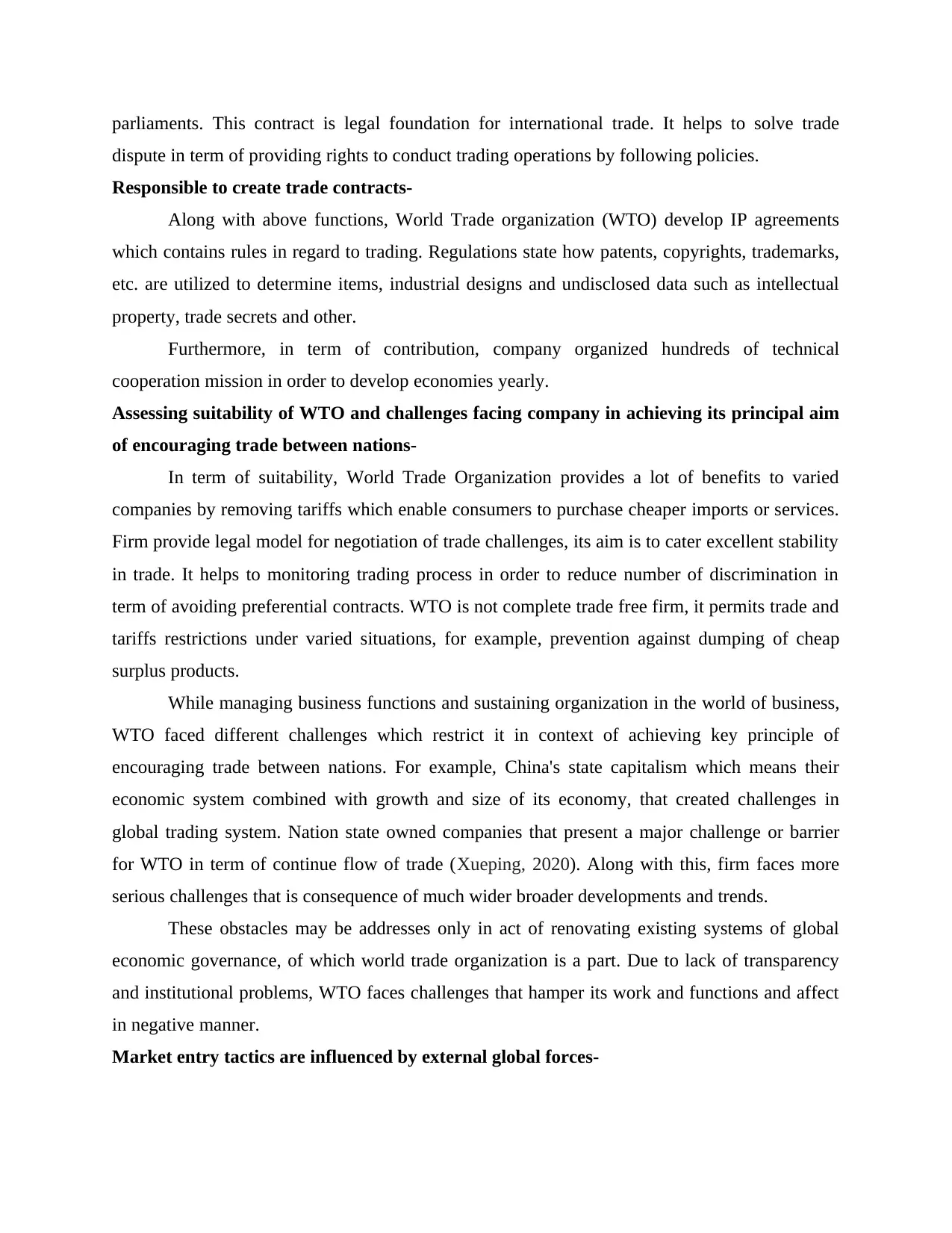
parliaments. This contract is legal foundation for international trade. It helps to solve trade
dispute in term of providing rights to conduct trading operations by following policies.
Responsible to create trade contracts-
Along with above functions, World Trade organization (WTO) develop IP agreements
which contains rules in regard to trading. Regulations state how patents, copyrights, trademarks,
etc. are utilized to determine items, industrial designs and undisclosed data such as intellectual
property, trade secrets and other.
Furthermore, in term of contribution, company organized hundreds of technical
cooperation mission in order to develop economies yearly.
Assessing suitability of WTO and challenges facing company in achieving its principal aim
of encouraging trade between nations-
In term of suitability, World Trade Organization provides a lot of benefits to varied
companies by removing tariffs which enable consumers to purchase cheaper imports or services.
Firm provide legal model for negotiation of trade challenges, its aim is to cater excellent stability
in trade. It helps to monitoring trading process in order to reduce number of discrimination in
term of avoiding preferential contracts. WTO is not complete trade free firm, it permits trade and
tariffs restrictions under varied situations, for example, prevention against dumping of cheap
surplus products.
While managing business functions and sustaining organization in the world of business,
WTO faced different challenges which restrict it in context of achieving key principle of
encouraging trade between nations. For example, China's state capitalism which means their
economic system combined with growth and size of its economy, that created challenges in
global trading system. Nation state owned companies that present a major challenge or barrier
for WTO in term of continue flow of trade (Xueping, 2020). Along with this, firm faces more
serious challenges that is consequence of much wider broader developments and trends.
These obstacles may be addresses only in act of renovating existing systems of global
economic governance, of which world trade organization is a part. Due to lack of transparency
and institutional problems, WTO faces challenges that hamper its work and functions and affect
in negative manner.
Market entry tactics are influenced by external global forces-
dispute in term of providing rights to conduct trading operations by following policies.
Responsible to create trade contracts-
Along with above functions, World Trade organization (WTO) develop IP agreements
which contains rules in regard to trading. Regulations state how patents, copyrights, trademarks,
etc. are utilized to determine items, industrial designs and undisclosed data such as intellectual
property, trade secrets and other.
Furthermore, in term of contribution, company organized hundreds of technical
cooperation mission in order to develop economies yearly.
Assessing suitability of WTO and challenges facing company in achieving its principal aim
of encouraging trade between nations-
In term of suitability, World Trade Organization provides a lot of benefits to varied
companies by removing tariffs which enable consumers to purchase cheaper imports or services.
Firm provide legal model for negotiation of trade challenges, its aim is to cater excellent stability
in trade. It helps to monitoring trading process in order to reduce number of discrimination in
term of avoiding preferential contracts. WTO is not complete trade free firm, it permits trade and
tariffs restrictions under varied situations, for example, prevention against dumping of cheap
surplus products.
While managing business functions and sustaining organization in the world of business,
WTO faced different challenges which restrict it in context of achieving key principle of
encouraging trade between nations. For example, China's state capitalism which means their
economic system combined with growth and size of its economy, that created challenges in
global trading system. Nation state owned companies that present a major challenge or barrier
for WTO in term of continue flow of trade (Xueping, 2020). Along with this, firm faces more
serious challenges that is consequence of much wider broader developments and trends.
These obstacles may be addresses only in act of renovating existing systems of global
economic governance, of which world trade organization is a part. Due to lack of transparency
and institutional problems, WTO faces challenges that hamper its work and functions and affect
in negative manner.
Market entry tactics are influenced by external global forces-
⊘ This is a preview!⊘
Do you want full access?
Subscribe today to unlock all pages.

Trusted by 1+ million students worldwide
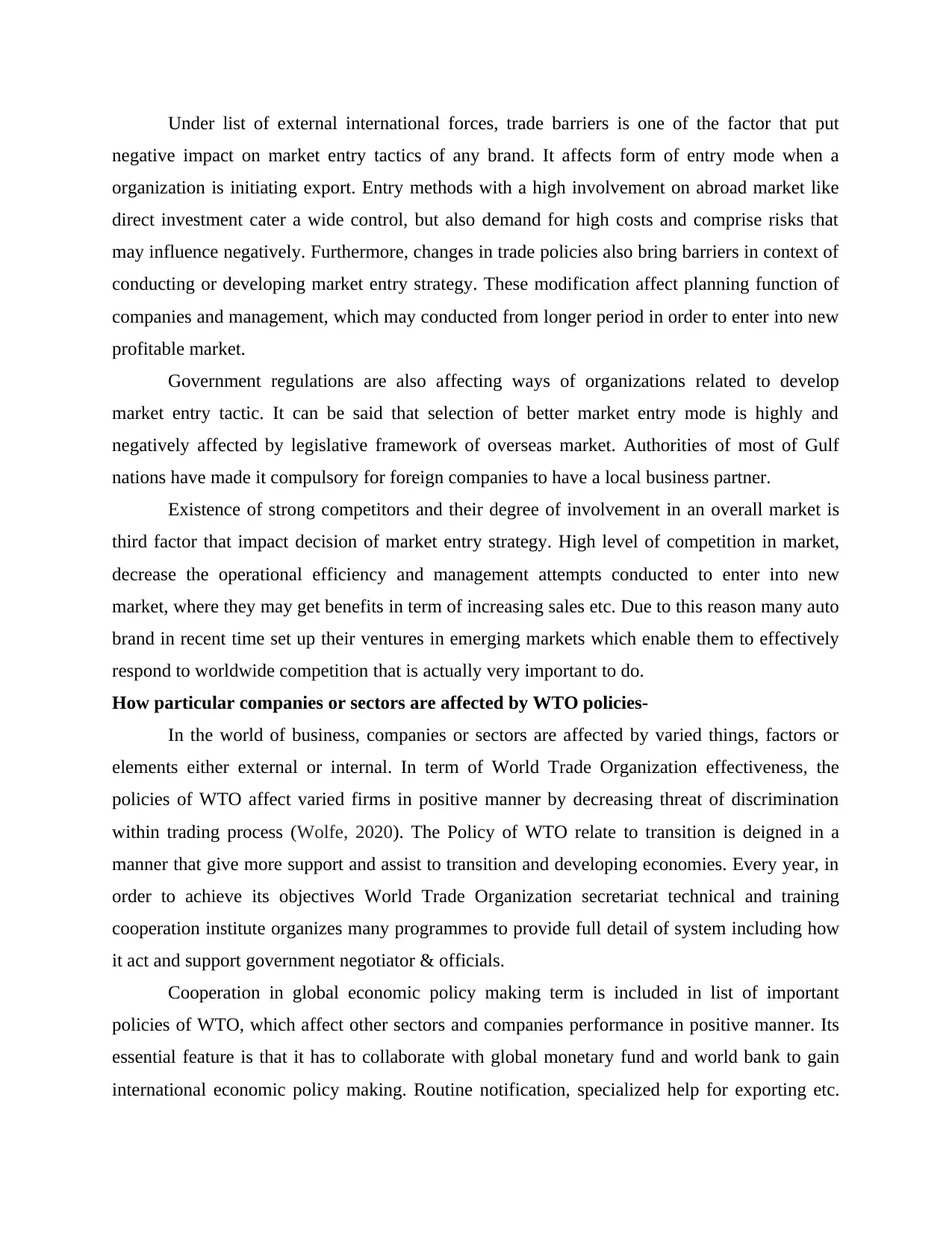
Under list of external international forces, trade barriers is one of the factor that put
negative impact on market entry tactics of any brand. It affects form of entry mode when a
organization is initiating export. Entry methods with a high involvement on abroad market like
direct investment cater a wide control, but also demand for high costs and comprise risks that
may influence negatively. Furthermore, changes in trade policies also bring barriers in context of
conducting or developing market entry strategy. These modification affect planning function of
companies and management, which may conducted from longer period in order to enter into new
profitable market.
Government regulations are also affecting ways of organizations related to develop
market entry tactic. It can be said that selection of better market entry mode is highly and
negatively affected by legislative framework of overseas market. Authorities of most of Gulf
nations have made it compulsory for foreign companies to have a local business partner.
Existence of strong competitors and their degree of involvement in an overall market is
third factor that impact decision of market entry strategy. High level of competition in market,
decrease the operational efficiency and management attempts conducted to enter into new
market, where they may get benefits in term of increasing sales etc. Due to this reason many auto
brand in recent time set up their ventures in emerging markets which enable them to effectively
respond to worldwide competition that is actually very important to do.
How particular companies or sectors are affected by WTO policies-
In the world of business, companies or sectors are affected by varied things, factors or
elements either external or internal. In term of World Trade Organization effectiveness, the
policies of WTO affect varied firms in positive manner by decreasing threat of discrimination
within trading process (Wolfe, 2020). The Policy of WTO relate to transition is deigned in a
manner that give more support and assist to transition and developing economies. Every year, in
order to achieve its objectives World Trade Organization secretariat technical and training
cooperation institute organizes many programmes to provide full detail of system including how
it act and support government negotiator & officials.
Cooperation in global economic policy making term is included in list of important
policies of WTO, which affect other sectors and companies performance in positive manner. Its
essential feature is that it has to collaborate with global monetary fund and world bank to gain
international economic policy making. Routine notification, specialized help for exporting etc.
negative impact on market entry tactics of any brand. It affects form of entry mode when a
organization is initiating export. Entry methods with a high involvement on abroad market like
direct investment cater a wide control, but also demand for high costs and comprise risks that
may influence negatively. Furthermore, changes in trade policies also bring barriers in context of
conducting or developing market entry strategy. These modification affect planning function of
companies and management, which may conducted from longer period in order to enter into new
profitable market.
Government regulations are also affecting ways of organizations related to develop
market entry tactic. It can be said that selection of better market entry mode is highly and
negatively affected by legislative framework of overseas market. Authorities of most of Gulf
nations have made it compulsory for foreign companies to have a local business partner.
Existence of strong competitors and their degree of involvement in an overall market is
third factor that impact decision of market entry strategy. High level of competition in market,
decrease the operational efficiency and management attempts conducted to enter into new
market, where they may get benefits in term of increasing sales etc. Due to this reason many auto
brand in recent time set up their ventures in emerging markets which enable them to effectively
respond to worldwide competition that is actually very important to do.
How particular companies or sectors are affected by WTO policies-
In the world of business, companies or sectors are affected by varied things, factors or
elements either external or internal. In term of World Trade Organization effectiveness, the
policies of WTO affect varied firms in positive manner by decreasing threat of discrimination
within trading process (Wolfe, 2020). The Policy of WTO relate to transition is deigned in a
manner that give more support and assist to transition and developing economies. Every year, in
order to achieve its objectives World Trade Organization secretariat technical and training
cooperation institute organizes many programmes to provide full detail of system including how
it act and support government negotiator & officials.
Cooperation in global economic policy making term is included in list of important
policies of WTO, which affect other sectors and companies performance in positive manner. Its
essential feature is that it has to collaborate with global monetary fund and world bank to gain
international economic policy making. Routine notification, specialized help for exporting etc.
Paraphrase This Document
Need a fresh take? Get an instant paraphrase of this document with our AI Paraphraser
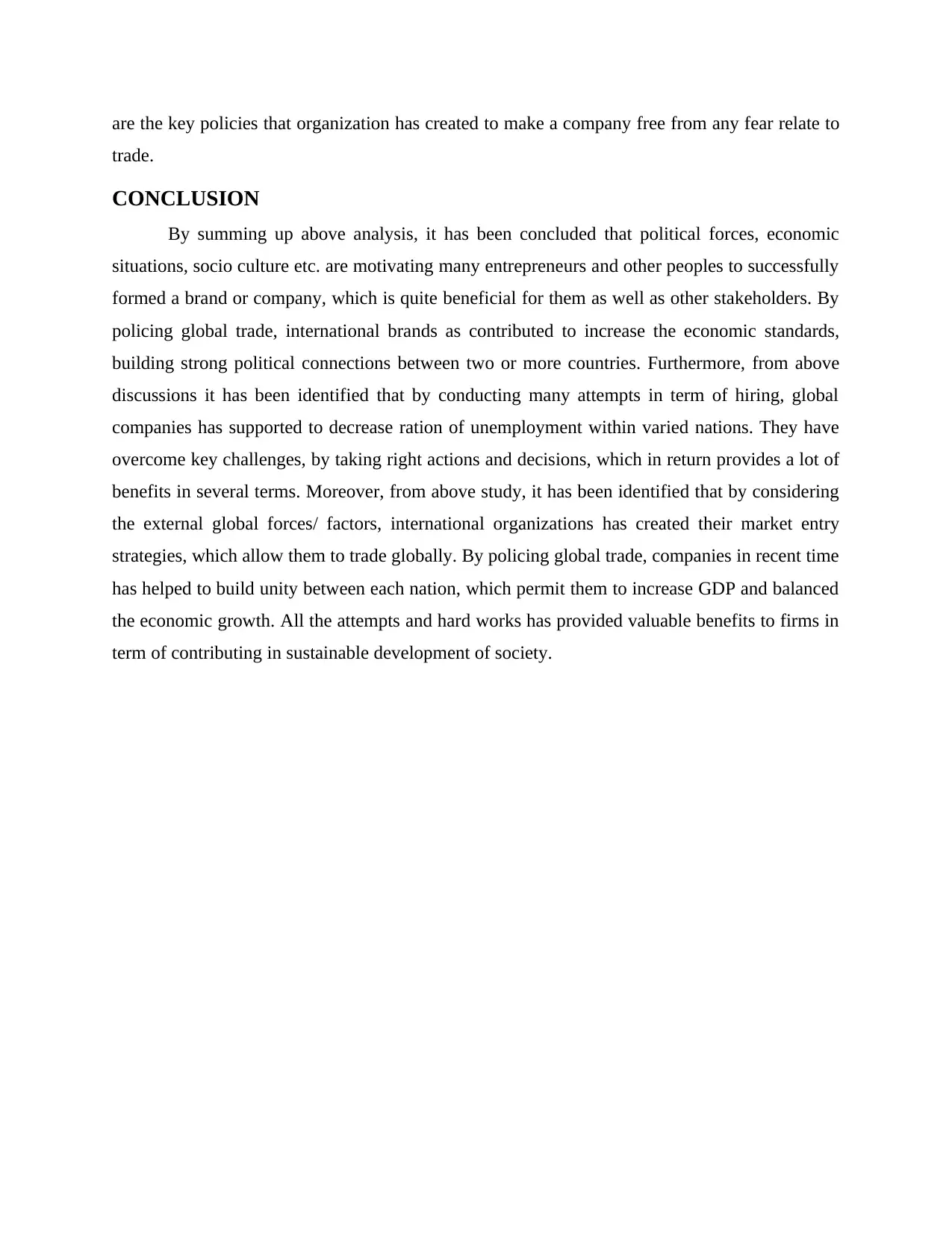
are the key policies that organization has created to make a company free from any fear relate to
trade.
CONCLUSION
By summing up above analysis, it has been concluded that political forces, economic
situations, socio culture etc. are motivating many entrepreneurs and other peoples to successfully
formed a brand or company, which is quite beneficial for them as well as other stakeholders. By
policing global trade, international brands as contributed to increase the economic standards,
building strong political connections between two or more countries. Furthermore, from above
discussions it has been identified that by conducting many attempts in term of hiring, global
companies has supported to decrease ration of unemployment within varied nations. They have
overcome key challenges, by taking right actions and decisions, which in return provides a lot of
benefits in several terms. Moreover, from above study, it has been identified that by considering
the external global forces/ factors, international organizations has created their market entry
strategies, which allow them to trade globally. By policing global trade, companies in recent time
has helped to build unity between each nation, which permit them to increase GDP and balanced
the economic growth. All the attempts and hard works has provided valuable benefits to firms in
term of contributing in sustainable development of society.
trade.
CONCLUSION
By summing up above analysis, it has been concluded that political forces, economic
situations, socio culture etc. are motivating many entrepreneurs and other peoples to successfully
formed a brand or company, which is quite beneficial for them as well as other stakeholders. By
policing global trade, international brands as contributed to increase the economic standards,
building strong political connections between two or more countries. Furthermore, from above
discussions it has been identified that by conducting many attempts in term of hiring, global
companies has supported to decrease ration of unemployment within varied nations. They have
overcome key challenges, by taking right actions and decisions, which in return provides a lot of
benefits in several terms. Moreover, from above study, it has been identified that by considering
the external global forces/ factors, international organizations has created their market entry
strategies, which allow them to trade globally. By policing global trade, companies in recent time
has helped to build unity between each nation, which permit them to increase GDP and balanced
the economic growth. All the attempts and hard works has provided valuable benefits to firms in
term of contributing in sustainable development of society.
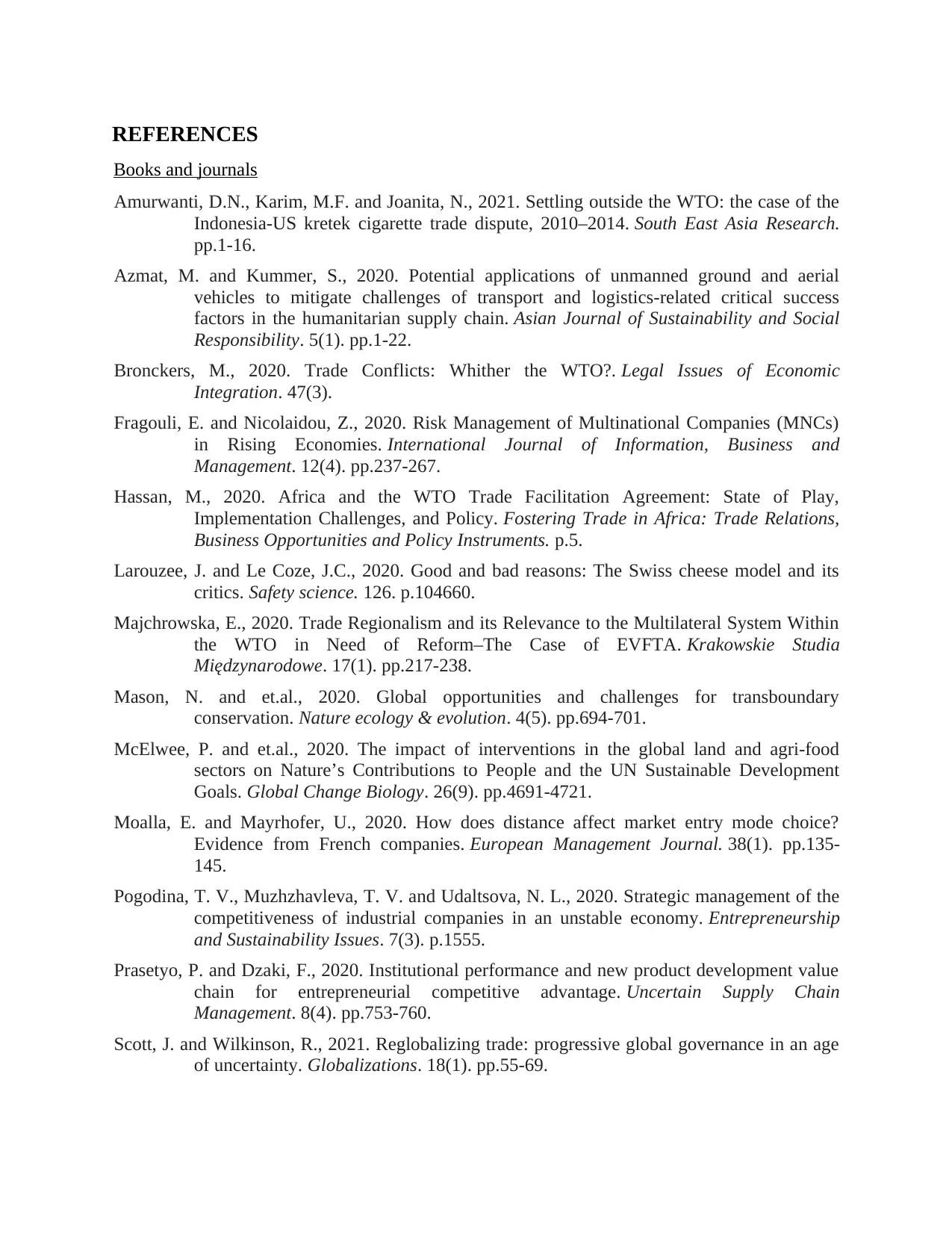
REFERENCES
Books and journals
Amurwanti, D.N., Karim, M.F. and Joanita, N., 2021. Settling outside the WTO: the case of the
Indonesia-US kretek cigarette trade dispute, 2010–2014. South East Asia Research.
pp.1-16.
Azmat, M. and Kummer, S., 2020. Potential applications of unmanned ground and aerial
vehicles to mitigate challenges of transport and logistics-related critical success
factors in the humanitarian supply chain. Asian Journal of Sustainability and Social
Responsibility. 5(1). pp.1-22.
Bronckers, M., 2020. Trade Conflicts: Whither the WTO?. Legal Issues of Economic
Integration. 47(3).
Fragouli, E. and Nicolaidou, Z., 2020. Risk Management of Multinational Companies (MNCs)
in Rising Economies. International Journal of Information, Business and
Management. 12(4). pp.237-267.
Hassan, M., 2020. Africa and the WTO Trade Facilitation Agreement: State of Play,
Implementation Challenges, and Policy. Fostering Trade in Africa: Trade Relations,
Business Opportunities and Policy Instruments. p.5.
Larouzee, J. and Le Coze, J.C., 2020. Good and bad reasons: The Swiss cheese model and its
critics. Safety science. 126. p.104660.
Majchrowska, E., 2020. Trade Regionalism and its Relevance to the Multilateral System Within
the WTO in Need of Reform–The Case of EVFTA. Krakowskie Studia
Międzynarodowe. 17(1). pp.217-238.
Mason, N. and et.al., 2020. Global opportunities and challenges for transboundary
conservation. Nature ecology & evolution. 4(5). pp.694-701.
McElwee, P. and et.al., 2020. The impact of interventions in the global land and agri‐food
sectors on Nature’s Contributions to People and the UN Sustainable Development
Goals. Global Change Biology. 26(9). pp.4691-4721.
Moalla, E. and Mayrhofer, U., 2020. How does distance affect market entry mode choice?
Evidence from French companies. European Management Journal. 38(1). pp.135-
145.
Pogodina, T. V., Muzhzhavleva, T. V. and Udaltsova, N. L., 2020. Strategic management of the
competitiveness of industrial companies in an unstable economy. Entrepreneurship
and Sustainability Issues. 7(3). p.1555.
Prasetyo, P. and Dzaki, F., 2020. Institutional performance and new product development value
chain for entrepreneurial competitive advantage. Uncertain Supply Chain
Management. 8(4). pp.753-760.
Scott, J. and Wilkinson, R., 2021. Reglobalizing trade: progressive global governance in an age
of uncertainty. Globalizations. 18(1). pp.55-69.
Books and journals
Amurwanti, D.N., Karim, M.F. and Joanita, N., 2021. Settling outside the WTO: the case of the
Indonesia-US kretek cigarette trade dispute, 2010–2014. South East Asia Research.
pp.1-16.
Azmat, M. and Kummer, S., 2020. Potential applications of unmanned ground and aerial
vehicles to mitigate challenges of transport and logistics-related critical success
factors in the humanitarian supply chain. Asian Journal of Sustainability and Social
Responsibility. 5(1). pp.1-22.
Bronckers, M., 2020. Trade Conflicts: Whither the WTO?. Legal Issues of Economic
Integration. 47(3).
Fragouli, E. and Nicolaidou, Z., 2020. Risk Management of Multinational Companies (MNCs)
in Rising Economies. International Journal of Information, Business and
Management. 12(4). pp.237-267.
Hassan, M., 2020. Africa and the WTO Trade Facilitation Agreement: State of Play,
Implementation Challenges, and Policy. Fostering Trade in Africa: Trade Relations,
Business Opportunities and Policy Instruments. p.5.
Larouzee, J. and Le Coze, J.C., 2020. Good and bad reasons: The Swiss cheese model and its
critics. Safety science. 126. p.104660.
Majchrowska, E., 2020. Trade Regionalism and its Relevance to the Multilateral System Within
the WTO in Need of Reform–The Case of EVFTA. Krakowskie Studia
Międzynarodowe. 17(1). pp.217-238.
Mason, N. and et.al., 2020. Global opportunities and challenges for transboundary
conservation. Nature ecology & evolution. 4(5). pp.694-701.
McElwee, P. and et.al., 2020. The impact of interventions in the global land and agri‐food
sectors on Nature’s Contributions to People and the UN Sustainable Development
Goals. Global Change Biology. 26(9). pp.4691-4721.
Moalla, E. and Mayrhofer, U., 2020. How does distance affect market entry mode choice?
Evidence from French companies. European Management Journal. 38(1). pp.135-
145.
Pogodina, T. V., Muzhzhavleva, T. V. and Udaltsova, N. L., 2020. Strategic management of the
competitiveness of industrial companies in an unstable economy. Entrepreneurship
and Sustainability Issues. 7(3). p.1555.
Prasetyo, P. and Dzaki, F., 2020. Institutional performance and new product development value
chain for entrepreneurial competitive advantage. Uncertain Supply Chain
Management. 8(4). pp.753-760.
Scott, J. and Wilkinson, R., 2021. Reglobalizing trade: progressive global governance in an age
of uncertainty. Globalizations. 18(1). pp.55-69.
⊘ This is a preview!⊘
Do you want full access?
Subscribe today to unlock all pages.

Trusted by 1+ million students worldwide
1 out of 14
Related Documents
Your All-in-One AI-Powered Toolkit for Academic Success.
+13062052269
info@desklib.com
Available 24*7 on WhatsApp / Email
![[object Object]](/_next/static/media/star-bottom.7253800d.svg)
Unlock your academic potential
Copyright © 2020–2026 A2Z Services. All Rights Reserved. Developed and managed by ZUCOL.





